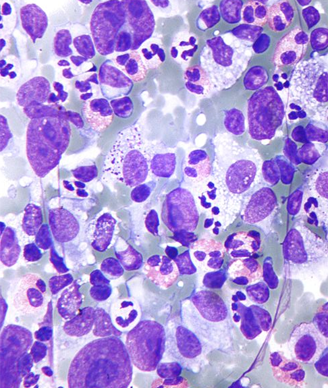FDA Accepts IND for HPK1 Inhibitor in Advanced Solid Tumors and Lymphomas
Acceptance of an investigational new drug application for GRC 54276 will allow investigators to proceed with a phase 1/2 trial evaluating the agent in patients with advanced solid tumors and lymphomas.
The FDA has accepted an investigational new drug (IND) application for the novel hematopoietic progenitor kinase 1 (HPK1) inhibitor GRC 54276 for the management of advanced solid tumors and lymphomas, according to a press release from Glenmark Pharmaceuticals.1
"We are excited about the prospects of what this new class of immune-oncology medicines may mean for patients in need," according to the manufacturers of GRC 54276.

The application will allow investigators to advance in a first-in-human, phase 1/2 trial evaluating GRC 54276 as therapy for patients with advanced solid tumors and lymphomas.
“Now that the FDA has accepted our IND application, we look forward to initiating the ongoing phase 1/2 study at the U.S sites,” Nikhil Amin, MD, chief scientific officer and president of Innovative Medicine Group at Glenmark Pharmaceuticals, said in the press release. “We are excited about the prospects of what this new class of immune-oncology medicines may mean for patients in need.”
Manufacturers of GRC 54276 are developing the agent as an orally administered immunotherapy-adjacent treatment for patients with solid tumors.2 Investigators believe its inhibition of HPK1, a negative regulator of T- and B-cell receptor signaling, is a potentially efficacious immune-oncology strategy. According to its manufacturers, GRC 54276 has previously demonstrated stand-alone efficacy and the ability to enhance current immunotherapy efficacy.
Investigators of the multicenter, open-label, phase 1/2 study are evaluating the preliminary anti-tumor activity, safety, tolerability, and pharmacokinetics of GRC 54276 in India as monotherapy or in combination with anti–PD-1 or anti–PD-L2 therapies in adult patients with advanced solid tumors and lymphomas.
In the study, a total of 16 patients with different advanced cancers have enrolled to date in India. Investigators plan to expand the study and incorporate American treatment sites in the coming months.
GRC 54276 originally received approval from the Drug Controller General of India, the country’s drug regulator, to carry out a phase 1 trial in April 2022.3 According to a press release on the approval, investigators were permitted to initiate a trial in India by June 2022. The manufacturers also highlighted plans to file clinical trial applications in Europe to expand their global clinical study program.
“We are delighted that our first novel molecule—has received approval from India's drug regulator to initiate a phase 1 clinical trial,” Glenn Saldanha, chairman and managing director of Glenmark, said in a press release on the original approval. “This reinforces Glenmark's growing capabilities of innovative clinical research and is a step closer in providing holistic solutions for cancer treatment.”
References
- Glenmark receives acceptance from U.S. FDA on its IND application for GRC 54276 to proceed with a phase 1/2, first-in-human clinical study of the molecule for the treatment of patients with advanced solid tumors and lymphomas. News release. Glenmark Pharmaceuticals. March 16, 2023. Accessed April 4, 2023. bit.ly/40MIEdm
- R&D pipeline. Glenmark Pharmaceuticals. Accessed April 4, 2023. bit.ly/3KuqAxJ
- Glenmark Specialty S.A. receives approval for conducting phase 1 clinical trial of its novel molecule GRC 54276 in patients with advanced solid tumors and Hodgkin's lymphoma. News release. Glenmark Pharmaceuticals. April 11, 2022. Accessed April 4, 2023. prn.to/3KxUxhy
How Supportive Care Methods Can Improve Oncology Outcomes
Experts discussed supportive care and why it should be integrated into standard oncology care.